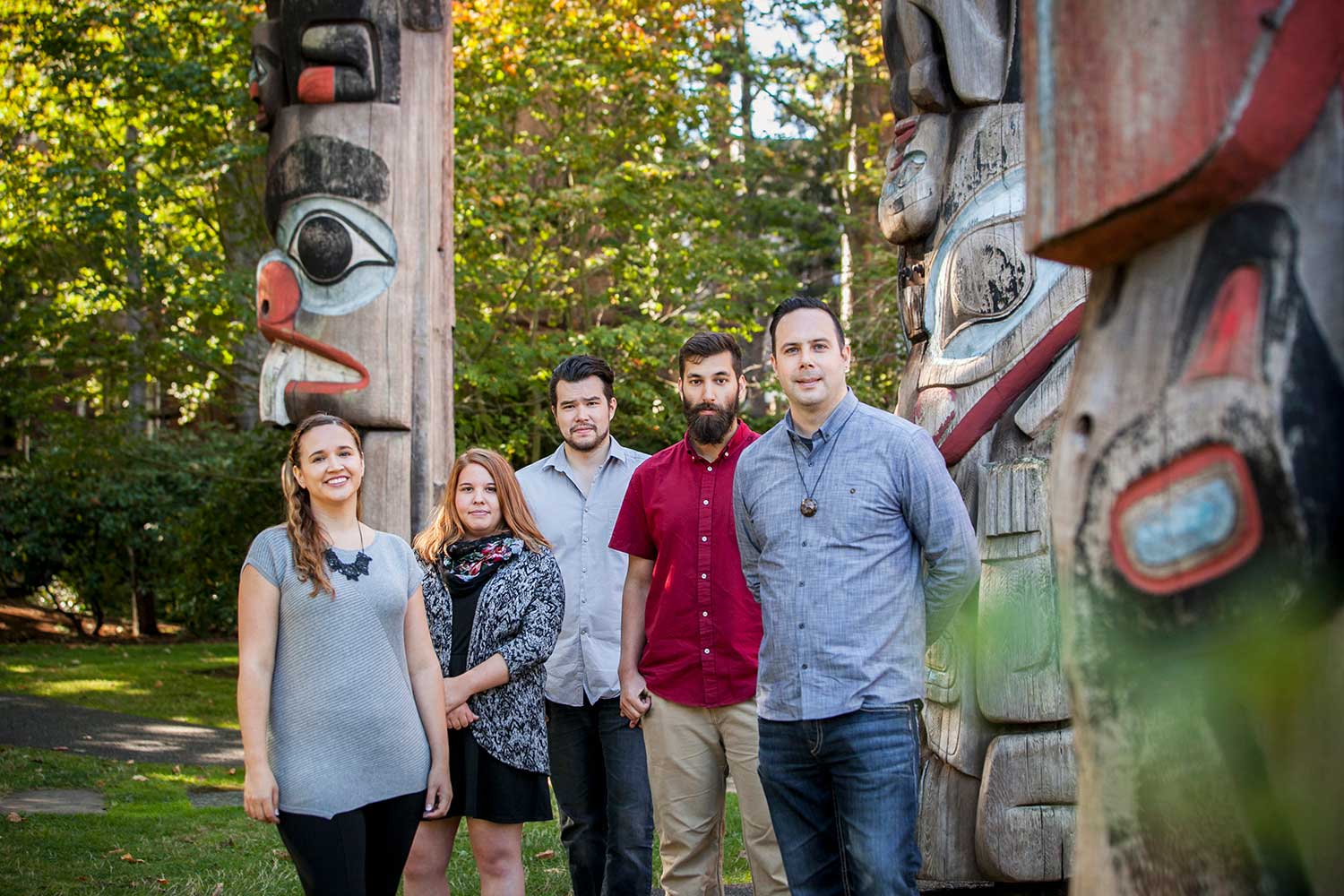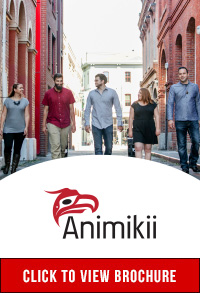Empowerment Through Technology
The word Animikii (pronounced ah-nih-mih-key) means thunderbird in Ojibwe. The thunderbird is a very powerful and respected being in many Indigenous cultures, and when its enormous wings beat, thunder is produced. Jeff Ward, founder of technology company Animikii Inc., has a very special relationship with the thunderbird. When he was a child, he was given the name Animikii Gwewinzenhs (Thunderbird Boy). Accordingly, he chose this name for his company when he founded it 13 years ago.
Born and raised in Manitoba, Ward is of mixed heritage, Ojibwe, Métis, English and Ukrainian, but he grew up in an Indigenous environment. This is why Animikii Inc., which specializes in web and software development, is proudly Indigenous-owned, with the sole mission of positively impacting Indigenous people through technology. Headquartered on the Coast Salish territory of British Columbia, the Animikii team’s mandate centres on empowering Indigenous organizations through technology. Its impressive clientele includes the Government of Canada, the Province of British Columbia, Cando, the Truth and Reconciliation Commission of Canada and the National Inquiry into Missing and Murdered Indigenous Women and Girls. In 2010, Animikii was recognized as
Aboriginal Business of the Year by the B.C. Achievement Foundation.
Once upon a time, Ward had his heart set on becoming a doctor. But in the late 1990s, when the age of the Internet was starting to run in high gear, Ward as a high school student became fascinated instead with coding. “Somebody made the mistake of paying me to make a website,” Ward joked. Soon afterwards, having been bitten by the entrepreneurial bug, dreams of medical school went out the window.
Ward was a self-taught web developer and designer, but he was good enough to attract clients. At only 16 years of age, he registered his first business and consulted in the evenings and weekends for clients building websites. Immediately following graduation, a job proposal from Edmonton landed neatly in his lap. A year later, opportunities called him to Silicon Valley, where he spent three years working with high-tech startups. Then in 2001 in the midst of the dot-com crash, Ward and his wife, Robyn, were two of the tens of thousands of people leaving the San Francisco Bay area. The Wards moved back to Canada.
The rise of the thunderbird
“After coming from a very materialistic and capitalistic environment, when I moved back to Canada I could see that many Indigenous organizations wanted to get online, tell their story and make connections,” Ward said, and this propelled him to go back into business. In 2003, he founded Animikii Inc. to deliver Indigenous-focused technological solutions. Since then, the company has been almost exclusively supporting First Nations communities, non-profit organizations, Indigenous entrepreneurs and other Indigenous-focused organizations.
The company began simply in a home office as a one-man show focusing only on web design. For Ward, who by that time had two small children, the proximity was the perfect way of balancing career with family. Eventually, clients needed something more than a static homepage; they wanted to update their content, they wanted to upload a new photo, and lacking coding know-how, they needed Ward’s help to do that. This need set the stage for Animikii to develop a new content management system (CMS) product called YikeSite.
“We built this content management system so that we can empower our clients to make content updates themselves,” Ward said. “This is a piece of Indigenous technology that we are very proud to have built.” The program is now the backbone of hundreds of websites across Canada and its popularity has allowed it to stand as its own company. Managed by Ward and his business partner, it is now based in Guelph, Ontario.
Building this application transformed Animikii, allowing Ward to explore the tech world beyond web design. Developing software became just as important. Ward soon created a content discovery engine called ContentGems with two co-founders based in the U.S. and Canada. Like YikeSite, it is now a separate company, running independently of Animikii. Although YikeSite and ContentGems started as side projects, both go hand in hand with the work that Animikii does on a day-to-day basis.
“More and more organizations are leveraging technology, in particular social media. We can provide an extra level of care and attention as an Indigenous technology company,” said Ward, adding that Animikii is uniquely positioned to lend a hand. Its five-member team (plus a handful of contractors), some of whom are Indigenous, comes from various professional backgrounds. From front-end design and content strategy to back-end development, Animikii is equipped with the best people for the job. In fact, Robyn Ward is the company’s content strategist.
“It is an exciting time right now in Canada for the Indigenous movement,” Ward said. “There’s a lot of activity going on. I just wanted to build a team that could support these other organizations the best way that we know how and that is through technology.”
A social enterprise
Aboriginal business is booming in Canada. Indigenous entrepreneurs are more likely to start businesses than others in Canada, says Ward. “We have a growing population and there is a huge economic upside and opportunity for the Indigenous community and Indigenous entrepreneurs as a whole,” he added.
Animikii is creating some of those opportunities. Due to its intensive community involvement, Animikii became a certified B Corporation (a certification given to companies that show considerable social and environmental accountability) earlier this year. From scholarships to Indigenous students for a kids’ coding camp to a bursary program for First Nations youth who are choosing business or technology as a career path, Animikii is changing lives.
Additionally, the company does pro bono work and donates both time and money to worthy causes. Ward sits on the advisory committee of the Bridging to Technology program with the First Nations Technology Council. In just 2015, Animikii helped clients from 16 non-profits, eight Indigenous communities, five Indigenous businesses, four health organizations and three educational institutions. The company is now looking to attract additional opportunities and expand in both Canada and the United States.







